A Master Class on the "Human Machine"
Jose Raul Capablanca was called the human machine. His games were filled with simplicity and beauty that can be understood quite easily, but extremely difficult to emulate in practice. In the fourth volume of the Master Class series Huschenbeth, Marin, Reeh and Mueller delve deeply into the various facets of the Cuban's play. Aditya Pai, the author of this article, after watching the DVD writes, "Since it covers all aspects of Capa’s play, it helps the viewers comprehensively improve their chess understanding. A review.
Review of Master Class Volume 4: Jose Raul Capablanca
By Aditya Pai
It was the best of times; it was the worst of times. It was the spring of hope; it was the winter of despair. If you find this reminiscent, let me reassure, you haven’t begun reading ‘A Tale of Two Cities’ for the umpteenth time. I’m referring to the period between the late-nineteenth and early-twentieth century in chess history – the years which witnessed a paradigm shift of sorts in its contemporary chess thinking. When swashbuckling sacrifices and crazy king hunts made way to a more scientific approach towards the game; when positional niceties took dominance over rhapsodic checkmates. One of the pioneers of this avant-garde approach was Capa the connoisseur, upon whom the fourth edition the of Master Class series concentrates.
The name, Jose Raul Capablanca, needs no introduction – patzers have heard of him, amateurs try to learn from him, masters revere him. There are even some more audacious ones who would blatantly declare his games to be boring. Be that as it may, Capablanca’s chess has had and continues to have an enormous impact on anyone who chooses to put aside such hackneyed misconceptions and learn from his games. Indeed, for a mediocre like me, or even club class players of expert strength, it might not be an easy task to fully grasp the concepts his games present. There is after-all so much more to his games than what is visible to the naked eye. And to this end, of making the invisible apparent, Master Class Volume 4 does an excellent job.
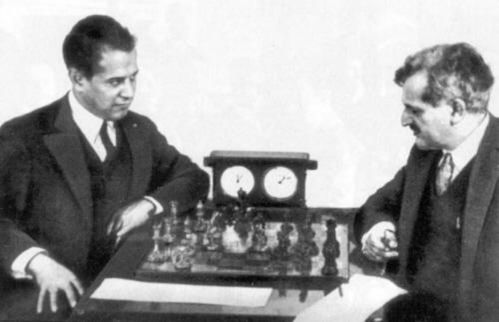
Master Class Volume 4: Capablanca has been segregated into 4 sections namely: Openings, Strategy, Tactics and Endgames. The DVD begins with GM Niclas Huschenbeth presenting the openings section which is followed by GM Mihail Marin’s presentation on Capablanca’s strategy; IM Oliver Reeh then throws light on Tactics (Capa’s trademark ‘Petite Combinaisons’) and in the final section, renowned endgame expert, GM Karsten Mueller, helps you decipher Capablanca’s endgames in the most passionate manner.
Openings by GM Niclas Huschenbeth
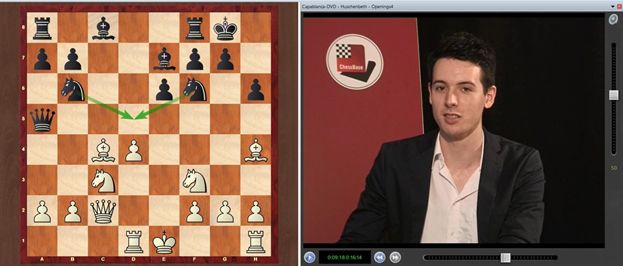
In a world made difficult by our silicon friends, chess openings have experienced a boom. With theory, at times, creeping in nearly 30 moves deep, it is but natural for aspiring masters to be taken aback by the sheer magnitude of it. But GM Niclas Huschenbeth, using Capa’s games as examples, offers a convincing anti-dote. In a relaxed, laid back manner, he explains how simple Capablanca’s approach towards openings was.
Within moments, you begin wondering how simple openings can be, and how complex had you made it for yourself. I even recall questioning myself if such an approach was viable until it occurred to me that even the mighty Magnus Carlsen does not approach openings in a starkly different manner. Although this segment, unlike the other segments in the DVD, is not an interactive one, it allows you to sit back with a pack of chips and watch GM Huschenbeth elucidate Capablanca’s simple yet effective opening methodology. Within just four 15-minute-long clips, you’d have gulped down a fairly decent amount of opening knowledge along with those chips!
Strategy by GM Mihail Marin
This segment, along with Mueller’s segment on endgame, is, in my opinion, of the highest importance to intermediate players. Our minds are often injected with strategic principles – like the superiority of bishops over knights or the value of a good knight over that of a bad bishop – to the point that one starts becoming obsessed by them without giving enough consideration to the position at hand.
GM Marin prefers to refrain from preaching such motherhoods and rather shows how Capablanca, as per the requirement of the position, changed plans; exchanged good knights for bad bishops; and essentially merged strategic and dynamic elements of the position to form a move by move approach. Also, in this segment, GM Marin stops at crucial points and invites the viewer to step into Capablanca’s shoes and find the right move.
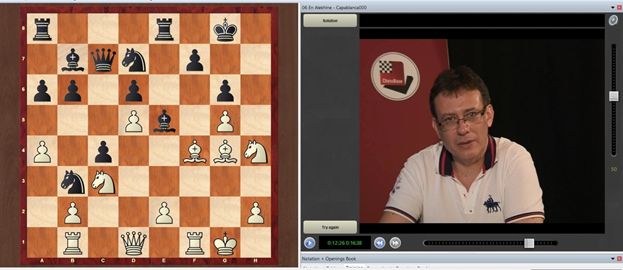
“There is a mixture of elements in his play. He can, in the same game, and sometimes in the same phase of the same game, be both strategic and speculative. He could change his plan if he thinks the position would require it.” – GM Mihail Marin, in the introduction.
Tactics by IM Oliver Reeh
IM Oliver Reeh’s Tactics segment is probably the most interactive one. Not only does he lucidly present Capablanca’s trademark ‘Petite Combinaisons’ but also incorporates the tactics that merely floated in the air. Below is one position which IM Reeh calls “A curious case of mutual chess-blindness."
Capablanca-Thomas, Hastings Victory Congress, 1919.
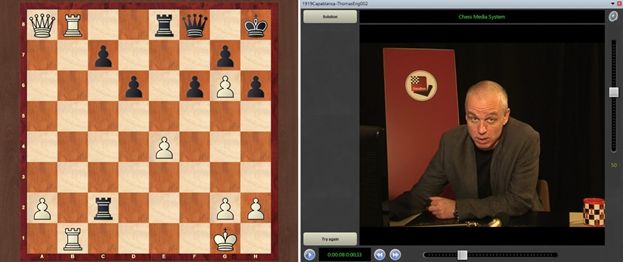
Endgames by GM Karsten Mueller
The final section of this DVD is an absolute treat. One of the best endgame teachers presenting the endgames of one of the best endgame players in history, what more can you ask for! GM Karsten Mueller not only provides insights into the endgame he is analysing, but also gives the viewers valuable advice on the endgames they should study in order to understand his clips better. Although only the first two clips of this segment are in the interactive format, the viewer could always take the liberty to pause the video and try his hand at the position. What’s most fascinating about this segment is GM Mueller’s passion for endgames. Saying it is evident would be a euphemism, it literally gushes out of the screen!
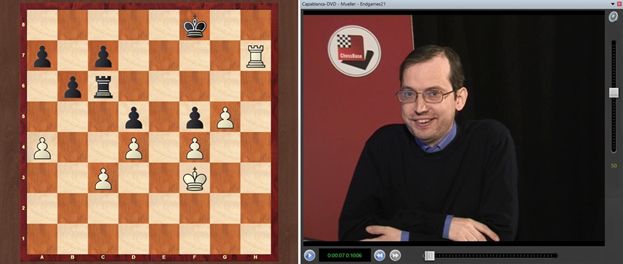
Apart from these four segments, the DVD comes with bonus materials like a Biography of Capablanca by Peter Schneider, 14 of his most remarkable endgames with annotations by GM Mihail Marin, a database of all of Capablanca’s games (many of which are annotated) and so forth.
All in all, I’d say that the DVD more than achieves its purpose of providing a thorough understanding of “The Chess Machine” they called Jose Raul Capablanca to its viewers. More importantly, since it covers all aspects of Capa’s play, it helps the viewers comprehensively improve their chess understanding.
Master Class Vol. 4:
|
About the Author
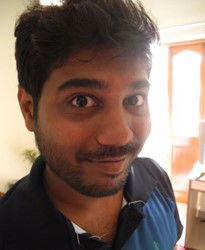
Aditya Pai is an ardent chess fan, avid reader, and a film lover. He has been an advertising copywriter and is currently pursuing a Master's in English Literature at the University of Mumbai. He loves all things German and is learning the language. He has also written scripts for experimental films.
Master Class Combo 1-7
Each Master Class volume is for Rs.999/-. Thanks to this combo offer you can get all seven of them for Rs.5999/- only.
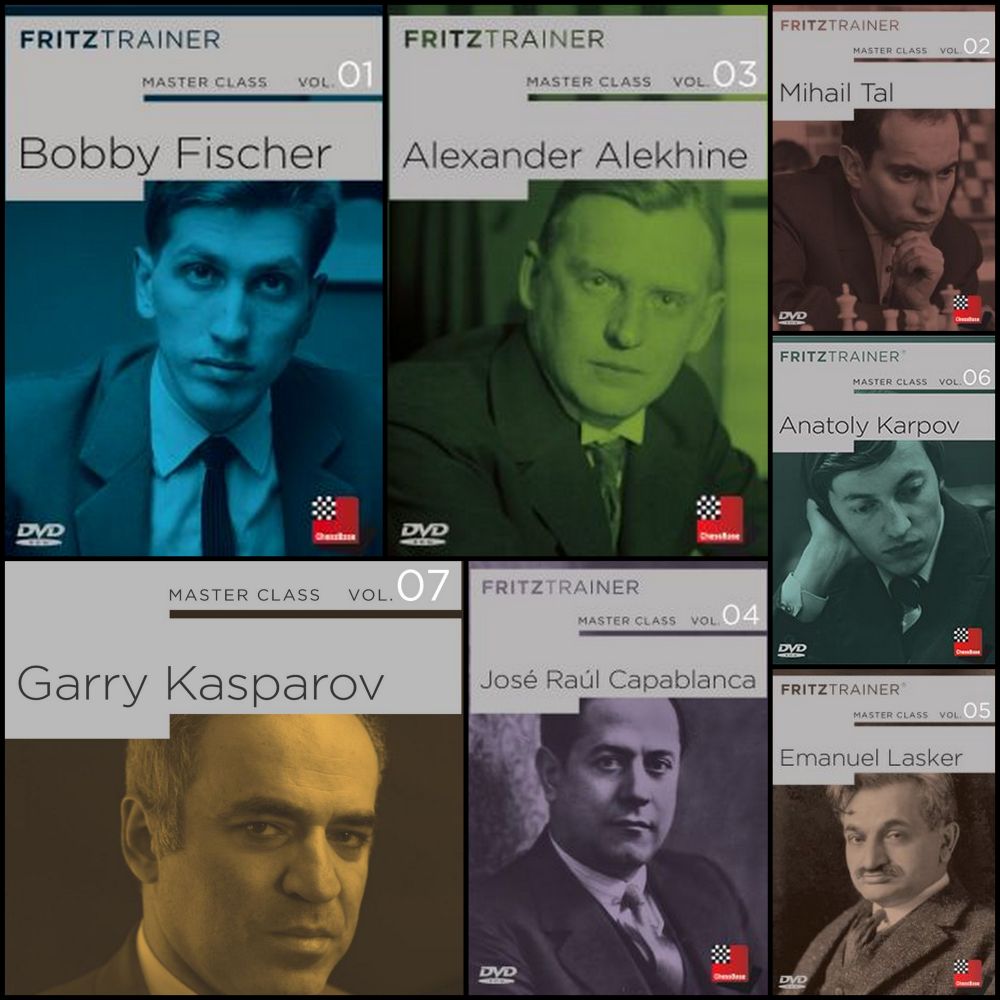
Buy Master Class Combo for Rs.5999/- from the shop
DVDs included in combo are (you can buy them individually by clicking on the link):
Master Class Vol.1 : Bobby Fischer
Master Class Vol.2 : Mikhail Tal
Master Class Vol. 3: Alexander Alekhine
Master Class Vol.4: Jose Raul Capablanca
Master Class Vol.5: Emanuel Lasker
Master Class Vol.6: Anatoly Karpov
Master Class Vol.7 Garry Kasparov

